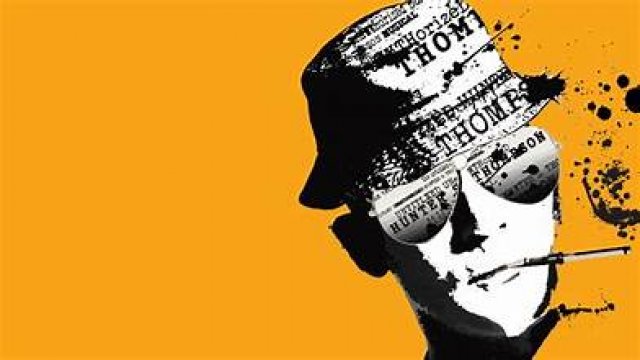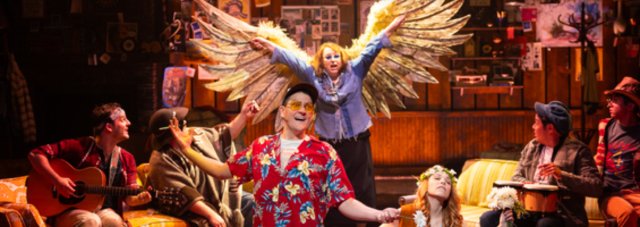La Jolla Playhouse Goes Gonzo
By: Sharon Eubanks - Sep 28, 2023
The world premiere of The Untitled Unauthorized Hunter S. Thompson Musical, is presented by the La Jolla Playhouse. Fifteen years in the making, the musical envisions Hunter’s life from childhood to his tragic death. The book is by Joe Iconis and Gregory S. Moss, music and lyrics by Iconis, and choreography by Jon Rua.
Walk into the theater and see the wacky set, a 60s-type hunting lodge/suburban living room/hippy hangout. The wall is loaded with everything from hunting trophies, dart boards, signs, couches and chairs in no discernable order. As the audience takes their seats, the actors and musicians stroll on stage one or two at a time, chatting with others, and lolling around. Unlike sets where the band is in the pit or off to one side of the set, the musicians are an integral part of the stage. This set signals things are going to happen.
Hunter Thompson bursts onto the set, tells the audience that this is the day he will die and he is going to tell you the story of his life. People, fasten your seatbelts. For the next two or so hours, this is a bumpy, drug, alcohol, sex-filled, historical joyride mostly through the 60s and 70s told by Hunter and his demons (the superb ensemble who took the stage) through rock and roll and dance. Always in the back of his head, his biggest demon of all is Richard Nixon. The clock starts ticking, HT has a story to tell.
In his formative years, his mother gives Hunter great American novels to read which she has permanently borrowed from the library. The young Hunter gets into trouble with a couple of other boys and sees the unequal application of justice as he gets time in a juvenile facility and the boys from the well-connected families get to walk away and get on with their lives. Between this and reading The Great Gatsby, Hunter’s mission and writing style began to form. He is going to be the voice of the others, outcasts, and freaks society does its best to ignore. Like Gatsby, Hunter is looking at that green light across the water, always searching.
Helped along with drugs and whiskey, Hunter races through his encounters with the Hells Angels and San Francisco flower children. Yet it is at the Kentucky Derby where Hunter finds his voice, quite by accident it seems. He is assigned to write about the Derby and he is partnered with the illustrator Ralph Steadman. Too busy partying, Hunter is running up against a publishing deadline. In a panic, he just sends his notes. Everyone loves them and just like that, gonzo journalism is born. He goes to Las Vegas with the Mexican-American activist Oscar Acosta which leads to his most well-known work, Fear and Loathing in Las Vegas, This hard-charging life is great. Hunter has found his voice, he is flying high. Yet always, there is Nixon, who embodies everything Hunter hates about the establishment. Nixon taunts, goads, and in an incredible dream sequence belittles Hunter and tells him he will take him down. Is that giant puppet actually a Frankenstein head with a Nixon face?
Ah, but the clock is ticking and Hunter has to tell the whole story. The drugs and alcohol take their toll. His writing loses its edge. His wife takes their young son and leaves him. As the years go by, Hunter is increasingly isolated. His son is now a grown up with a family of his own. Nixon appears and tells him he has lost. Hunter’s search for the green light, always visible, but always just out of reach, is over.
The ensemble cast is magnificent as the players change from character to character right on the set. A particular shoutout to George Abud, who portrays Nixon to a tee. The play should have legs. Don’t forget to fasten your seatbelts.


